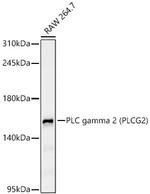Search Thermo Fisher Scientific
FIGURE: 1 / 1
PLCG2 Antibody (MA5-55328) in WB

Product Details
MA5-55328
Species Reactivity
Host/Isotype
Expression System
Class
Type
Clone
Immunogen
Conjugate
Form
Concentration
Purification
Storage buffer
Contains
Storage conditions
Shipping conditions
Product Specific Information
Immunogen Sequence: HFVLGTSAYF ESLVELVSYY EKHSLYRKMR LRYPVTPELL ERYNMERDIN SLYDVSRMYV DPSEINPSMP QRTVKALYDY KAKRSDELSF CRGALIHNVS
Target Information
Phosphoinositide-specific phospholipase C (PLC) plays a crucial role in the initiation of receptor mediated signal transduction through the generation of the two second messengers, inositol 1,4,5-triphosphate and diacylglycerol from phosphatidylinositol 4,5-bisphosphate. There are many mammalian PLC isozymes, including PLC beta1, PLC beta2, PLC beta3, PLC beta4, PLC gamma1, PLC gamma2, PLC delta1, PLC delta2 and PLCe. PLC delta exists as four different isoforms. PLC delta1, a calcium signal amplifier, is activated by an atypical GTP-binding protein. In addition, PLC delta1 is an effector for GTP-binding protein transglutaminase II-mediated oxytocin receptor and alpha1B-adrenoreceptor signaling. Mouse PLC delta1 is highly expressed in brain, heart, lung and testis. PLC delta is abnormally accumulated in autopsied brains with Alzheimer's disease (AD), suggesting that it may play a role in the pathology of AD. PLC delta2 is markedly expressed in type II intestinal metaplasia and in the adenocarcinoma. When PLC delta2 is expressed in type I intestinal metaplasia, the metaplasia is generally considered benignant, yet evolves toward neoplastic transformation. Thus, PLC delta2 expression may be a possible marker of gastric malignant transformation.
For Research Use Only. Not for use in diagnostic procedures. Not for resale without express authorization.
References (0)
Bioinformatics
Protein Aliases: 1-phosphatidylinositol 4,5-bisphosphate phosphodiesterase gamma-2; 1-phosphatidylinositol-4,5-bisphosphate phosphodiesterase gamma-2; Phosphoinositide phospholipase C-gamma-2; phospholipase C, gamma 2 (phosphatidylinositol-specific); Phospholipase C-gamma-2; Phospholipase C-IV; PLC gamma 2; PLC gamma-2; PLC gamma2; PLC- gamma2; PLC-gamma; PLC-gamma-2; PLC-IV
Gene Aliases: APLAID; FCAS3; PLC-gamma-2; PLC-IV; Plcg-2; PLCG2; PLCgamma2
UniProt ID: (Human) P16885, (Mouse) Q8CIH5
Entrez Gene ID: (Human) 5336, (Mouse) 234779

Performance Guarantee
If an Invitrogen™ antibody doesn't perform as described on our website or datasheet,we'll replace the product at no cost to you, or provide you with a credit for a future purchase.*
Learn more
We're here to help
Get expert recommendations for common problems or connect directly with an on staff expert for technical assistance related to applications, equipment and general product use.
Contact tech support
